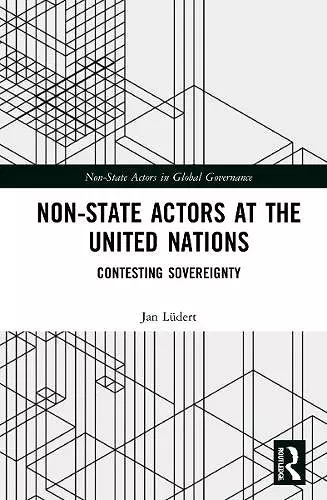Non-State Actors at the United Nations
Contesting Sovereignty
Format:Hardback
Publisher:Taylor & Francis Ltd
Published:5th Aug '22
Currently unavailable, and unfortunately no date known when it will be back

This book explores the role and relevance of non-state actors (NSAs) in the international system by analyzing the ways these actors gain influence in the United Nations (UN). Offering a systematic, theoretical, and empirical account of how NSAs contest and potentially change state sovereignty through the UN the author considers the successes and failures of national liberation movements and indigenous peoples and examines how and under what conditions such a challenge is possible. This book will be of great interest to scholars and graduate students in the fields of international law, politics, history, human rights, and governance. It will be especially useful to those with an interest in the proliferation of non-state actors in the international system and the role and relevance of Intergovernmental Organizations.
"While non-state actors have proliferated in contemporary global governance, Lüdert demonstrates clearly how essential they have been since the establishment of the United Nations in accelerating decolonization and fostering the rights of indigenous peoples. By probing the normative impact of non-states on challenging state sovereignty, this book extracts essential insights for addressing such current existential threats as climate change and pandemics."
-Thomas G. Weiss, CUNY Graduate Center
"International Relations scholars are increasingly attending to non-state and sub-state forms of agency, revealing a richer tapestry of transnational political activity. By focusing on ways that non-state actors contest the foundational institution of sovereignty at the United Nations, Jan Lüdert’s book provides an important addition to this growing body of research. The findings are nuanced and thought-provoking, and presented in clear and engaging prose. Lüdert concludes that 'State sovereignty is not only what states make of it— it is mutable when [non-state actors] can engage [intergovernmental organisations] to alter normative standards and prevailing practices of state sovereignty.' This book thus offers a theoretically and empirically rich examination of sovereignty’s inherent complexity and offers valuable guidance—and motivation—for future research and policy-making. The combination of theoretical sophistication and careful treatment of the case studies will appeal to scholars of international relations, global governance, and international law, as well as practitioners working within governments, intergovernmental and non-governmental organisations, and civil society."
-Adam Bower Director, Centre for Global Law and Governance, University of St Andrews
"Sovereignty as one of the core concepts in international relations and the north-south-encounter remains contested since answering how state sovereignty is contested requires investigating how authority works relationally, historically, territorially, and politically. The book "Non-State Actors at the United Nations" offers a reflective contribution to the debate by focusing on the understanding and influence of these actors in various dimensions of challenging state sovereignty. The book thus not only offers a theoretical venue but also empirical insights into the ways national liberation movements and indigenous groups question the existing sovereignty and petition for their rights. The book is not only an important part of international law readings, but also political science and international organizations and helps to understand the long term processes of international(ized) politics."
-Maria Ketzmerick, Akademische Rätin, Lehrstuhl für Soziologie Afrikas, Universität Bayreuth
"Professor Lüdert defines what we may consider as a more sophisticated form of traditional lobbying, and avoids using the term to ensure attention is given to the long-term efforts by NSA to be heard. More importantly, throughout the book, we need to question the regular impact and long-term value of these efforts in ‘contesting sovereignty’. While long-time efforts are extremely well documented, there are some triumphs, albeit limited. The UN is a massive international bureaucracy, with many sovereign players, and only a handful of decision-makers: The Security Council. As such, all of the quixotic efforts by NSA have at best achieved limited success, particularly when measured against their effort. This book is of extreme value to study, understand, and perhaps redefine how NSA could be more successful."
-Jessica De Alba-Ulloa, Director, Anahuac Center for Research in International Relations, Universidad Anáhuac México
ISBN: 9781032244624
Dimensions: unknown
Weight: 590g
220 pages